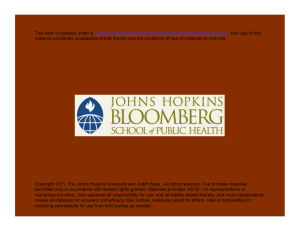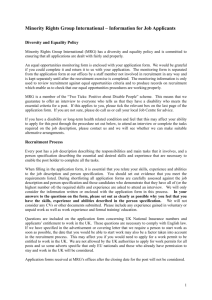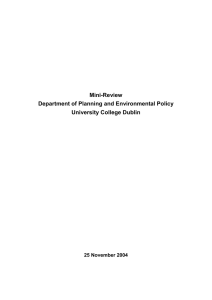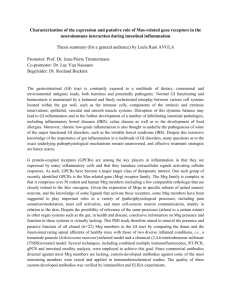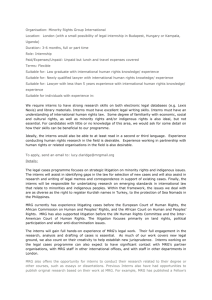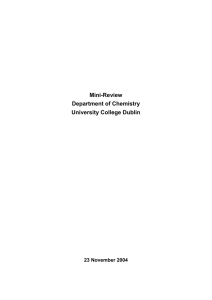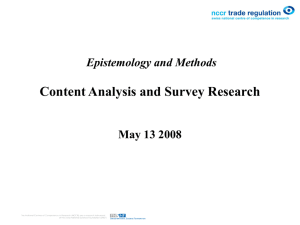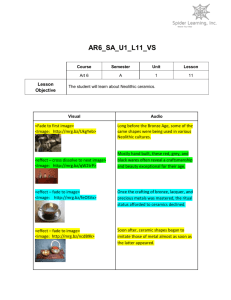Department of Politics (11/2004) (opens in a new window)
advertisement
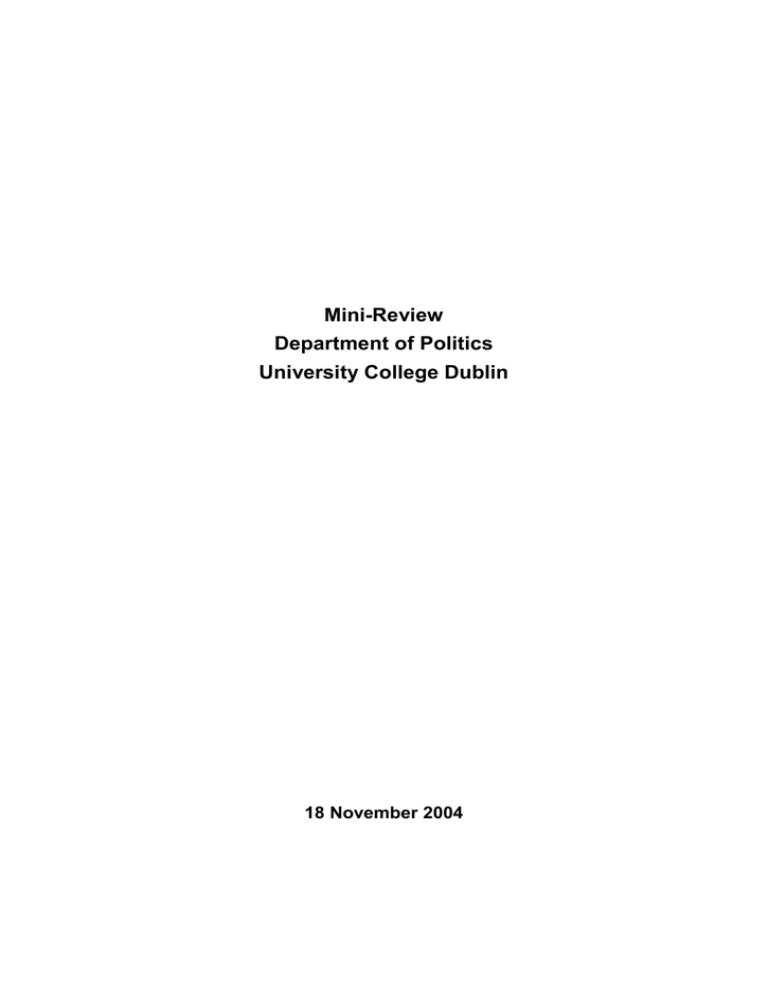
Mini-Review Department of Politics University College Dublin 18 November 2004 The Review Members of Review Group Professor Pat Shannon Professor Jeremy Gray Dr Derek Mitchell Ms Elaine Cox Department of Geology Department of Environmental Resource Management Department of Botany Quality Assurance Office Chair Methodology The Mini-Review Group (MRG) visited the Department of Politics on Thursday, 18 November 2004. In preparation for the visit the MRG reviewed the following documents supplied by the Department: Mini-Review Progress Report Peer Review Group Report Self-assessment Report Quality Improvement Plan Faculty of Human Sciences Draft Strategic Development Plan Faculty of Human Sciences Strategic Planning Dialogue Phase 1 During the visit the MRG met with the Head of Department, academic and administrative staff (in groups and individually), undergraduate and postgraduate student representatives and the Dean of the Faculty of Human Sciences. Findings of the Mini-Review Group 1) General Comments The MRG was impressed by the collegial nature of the Department. It is an enthusiastic and cohesive department from the top down. A unified view of how members would like to see the Department develop is very much in evidence, although it is currently not documented in a formal departmental strategic plan. Central to this vision of the future is a belief that the Department should maintain its current breadth of teaching and research interests rather than focus on a smaller number of specific areas. Department members are very well informed of developments within the Faculty and the University. Their vision is that the Department of Politics would act as a ‘growth node’ within the Faculty during the forthcoming University-wide strategic changes. They hope that relevant disciplines and research units will be aligned with their discipline as a possible School of Politics and International Relations. Feedback from students at all levels was strongly supportive of the Department and it’s members. Students expressed complete satisfaction in relation to the courses taught and the subject progression throughout their time at UCD. 2 The MRG were also impressed by the level of engagement of the staff in the QA/QI process. The Department’s success in using their QIP to justify to the Faculty and the Quality Improvement Finance Committee (QIFC) the need for a Lecturer, an Executive Assistant and the allocation and refurbishment of a new room, and their development since the PRG review strongly illustrates the potential positive outcomes of this process. 2) Planning and Organisation General There is a nice mix of formality and informality in the organisation of the Department that results in a collegial environment. This is a result of the staff members in the Department having, in general, ‘grown up’ together. Staff members are aware of each other’s strengths and weaknesses and have a working relationship that emphasises everyone’s strengths as far as possible. However, it is important that more formal arrangements be set in place relating to the Headship of the Department, the allocation of workloads and the strategic development of the Department. The members of the Department have a unified strategic vision but it is important that this be crystallised and documented as soon as possible. A departmental Strategic Plan is currently being developed and it is recommended by the MRG that this includes long-term goals as well as dealing with possible developments over the next five years. This is a key issue because several staff members will retire in the coming few years, so consideration of replacement posts in subject areas that the Department needs to develop or sustain is vital. The institution of a rotating Headship was recommended in the PRG Report. This has not happened yet but is being considered. It was acknowledged by all members of the Department met by the MRG that the current Head of Department is doing an excellent job. However, he will be retiring soon. The MRG recommends that the implementation of a rotating Headship be instigated as a matter of urgency to allow for appropriate planning in the near future. One of the recommendations in the PRG Report was that ‘departmental meetings and meetings of the newly formed subcommittees should be formalised with the agenda being available at least one week in advance and planned in a predictable cycle’. This level of organisation has been introduced and appears to be working well. The allocation of workloads has not been addressed by the Department in a formal manner. With the likely changes in departmental staff and new institutional structures in the coming years, this could become an area of tension. The MRG recommends that the Department draw up a workallocation model with a transparent system for balancing teaching, research and administrative functions between the academic staff. It is not necessary for staff to teach the same number of hours but there needs to be some degree of equity. 3 The issue of sabbatical leave is increasingly important across the University. After meeting with the Head and staff of the Department, it is clear that members of the Department have been able to avail of some sabbatical leave. However, adequate funding is a problem. Members of the Department favour 1-year sabbaticals rather than semester leave. The latter offers more flexibility with regard to lecture/course schedules and has fewer funding difficulties. However, it limits the overall benefit in terms of a sustained period of active research free from teaching and administrative duties. The MRG recommends that the Department make more frequent use of a semester leave system, integrated with the fewer opportunities for full-year funded sabbaticals. Resources The staff:student ratio (1:441 which will drop to 1:40 after a new appointment) is very much an issue particularly in light of modularisation. The MRG was impressed that the Department is able to provide excellent teaching, administration and pastoral care to students, given the large numbers involved. The MRG does not believe this excellence can be sustained in the long term unless the staff: student ratio is reduced further. The MRG is also concerned that for students, particularly undergraduates, there is very little social connection with the Department or other students in the Department. The MRG recommends that the Department consider ways of ‘capping’ undergraduate numbers. An inequity and lack of transparency regarding resource allocation exists within the Faculty. The MRG understands that the initiation of the Faculty of Human Sciences following the subdivision of the Faculties of Arts and Celtic Studies two years ago, resulted in a decrease in financial resources to the Faculty. However, the method of allocating resources to departments is unclear to the MRG and seems to be based on historical reasons rather than FTEs. The MRG recommends that the University and the Faculty reconsider their resource allocation model. Facilities The budgetary constraints also adversely affect the facilities of the Department. Space is a key issue. It is paramount that all permanent staff members continue to have their own office. With two new academic staff appointments in the next few months, the MRG endorses the recommendation in the PRG Report that this space be provided. The Dean has promised to ensure that all staff continue to have individual offices. The MRG endorses the views of staff that offices should be contiguous to the Department. The recommendation in the PRG Report, endorsed by the MRG, to allocate an office as an administrative centre has not been met. This would allow easier access to the Postgraduate Administrator, since currently access is through the office of the Undergraduate Administrator. The existing office 1 Department of Politics Five-Year Quality Assurance Progress Report, November 2004 4 space is inadequate for the normal running of an administration office. There is no storage space. The PRG Report recommended that the hours of access for students to the Departmental Administrator be limited. However, as there are now two administrative staff in the Department the MRG recommends that this limit be removed. Both staff and students have commended the Administrative staff on their openness and helpfulness and on their accessibility outside the posted hours. The MRG believes that this openness is due to the personalities and professional attitude of the Administrative staff involved and a problem could arise with limitation of hours of access if staff changes occur in the future. One item in the Mini-Review Progress Report was the lack of direct telephone access for staff. The MRG recommends that the Head of Department write to the Telephones Service requesting that direct access be given if, on reflection, the Department decides that such open access is desirable and is within their budget. 3) Teaching & Learning and Research The Department offers a wide range of courses to undergraduates who find them interesting and of relevance. However, there appears to be a gap in quantitative analysis throughout the syllabus. The running of tutorials seems to be problematic with regard to catering for large groups of students in each year. The tutors find the marking of essays involves an excessive amount of work. However, the students appreciate the thoroughness of this work. The PRG Report commented that ‘some students feel somewhat frustrated because they do not know exactly what is expected of them in their examinations’. This situation appears to have since changed and the students who met with the MRG all reported that they had a very clear understanding of what is expected of them. They were very supportive of the structure and content of the courses and of the examination process. The MRG got the impression from the Mini-Review Progress and PRG Reports that double marking of examination scripts is not used by the Department. However, during the interview with the Head of Department it became clear that double marking of anomalous marks, all borderline cases reviewed etc. is undertaken routinely. The MRG strongly approves of this approach and considers it to be robust. The examination results of the Department of Politics correlate strongly with the student exam results in cognate departments. This is also the case with the spread of marks – something which was highlighted in the PRG Report – and now an increased proportion of undergraduate First and Upper-Second Class Honours degrees are awarded, using University descriptors and in alignment with cognate subjects. The PRG Report recommended that the Department should devise a system of formal student evaluation of teaching. While individual members of the 5 Department carry out such an evaluation, the system is not uniform and is sporadically applied. The MRG recommends that a formalised course evaluation by students be instigated by the Department for all years or courses. The Department has recently started using “Blackboard”. Course notes are available on-line. However, it was the view of the staff that more support in using “Blackboard” is vital, particularly taking into account the varied levels of technological abilities of staff in this regard. The Department favours the idea of introducing Teaching Assistants (TAs) to support large class teaching, to help reduce the academic staff’s teaching workload and to increase research output. They envisage such a resource being salaried rather than being paid hourly like tutors. This would provide funding to the TA for their own research and they would be available for teaching for the Department. The proposed TA position is similar to that of Research Demonstrators in the Faculty of Science. This proposal has a significant resource implication as it is not envisaged that they would replace tutors. The MRG feels the proposal merits consideration but does not believe that it has been fully researched. The absence of a course in Research Methodology was identified in the PRG Report. However, it was not an explicit recommendation that such a course be provided. During the Mini-Review both the staff and students of the Department identified this as a gap in the undergraduate curriculum. The MRG is aware that the appointment of such a position would have major resource implications. The Dean has proposed a compromise position which would be of particular relevance after modularisation – a Lecturer in Research Methodology shared between a number of departments in the Faculty, with the discipline from which the person is drawn having him/her as a half-time department member. The MRG sees two potential problems with this solution: (a) it could be difficult to recruit someone who would, in effect, be a technician with very little opportunity to develop their own academic interests and (b) there may be resentment from departments that are not the ‘home’ department of the Lecturer. If this position is accepted by the Faculty of Human Sciences and the successful candidate for the lectureship is housed in a different department to Politics, then the MRG recommends that a part-time lectureship be established to provide extra lectures in research methodology of specific relevance to Politics. This Department places a strong emphasis on research and all members of the academic staff are research active. The Department is the most research active in the Faculty2. There are very strong ties with a number of research institutes, e.g. ISSC. Feedback from both staff members and research students indicate that these links work well. The departmental structures for support and monitoring of the progress of PhD students appear to be very effective. 2 Faculty of Human Sciences Strategic Planning Dialogue Phase 1, Table 8, p.18 6 With the increased emphasis in the University on maximising high-impact publications, the Department should consider the most appropriate fora for publication. In particular the balance between international journal publications and books with reputable publishers needs to be addressed. 4) Faculty and University Support A number of recommendations that were the responsibility of the Faculty or the University were raised in the PRG Report and were highlighted again during the Mini-Review. These included the following: The Library – issues related to provision of core journals for the discipline and other relevant journals necessary for research within the Department, and the provision of textbooks were emphasised in the SAR 5 years ago and the situation has since deteriorated. Staff reported having to use TCD Library facilities to access mainstream Politics journals and books due to their absence from the UCD Library. The Department should instigate a subcommittee to review and prioritise, on a regular basis, the Department’s journal and book requirements in the context of the limited Library budget. The MRG endorses the view of departmental staff that the provision of books and journals is inadequate for the needs of the Department. Personnel Department – staff reported good contact with individuals in the Personnel Department. However, there were significant difficulties resulting from lack of communication between Personnel and departments and a general poor delivery of service particularly in relation to advertisements for academic positions. Issues also arose regarding a lack of clear procedures for interviews and informing successful and unsuccessful candidates. The MRG recommends that the Head of Department bring these concerns and issues to the attention of the Head of Personnel. Bursar’s Office – again staff commented on good personal contact but problems with late arrival of reports of Accounts, inaccuracies in these reports and a lack of communication regarding updates to systems cause a lot of frustration. The Head of Department should convey these issues and concerns to the Bursar. Recommendations of the Mini-Review Group Although the Department has a strategic vision, it is important that this be crystallised and documented as soon as possible. The MRG recommends that the departmental Strategic Plan, currently under construction, should include long-term goals as well as dealing with developments over the next five years. The MRG recommends that the implementation of a rotating Headship be instigated as a matter of urgency to allow for appropriate planning in the near future. 7 The MRG recommends that the Department consider drawing up a work allocation model and having a transparent system for balancing teaching, research and administrative duties between the academic staff. The MRG recommends that the Department make more frequent use of a semester leave system, integrated with the fewer opportunities for full-year funded sabbaticals. The MRG recommends that the Department consider ways of ‘capping’ undergraduate student numbers. These may include the running of Denominated Entry Degree Programmes. The MRG recommends that the Faculty, in conjunction with the University, reassess the current resource allocation model in order to allow a greater degree of transparent equity in funding for departments in the Faculty of Human Sciences. The MRG recommends that all staff have individual offices that are contiguous to the Department. The MRG recommends that an office be allocated as an administrative centre. The MRG recommends that the limit to the hours of access to the departmental administrative staff be removed. The MRG recommends that the Head of Department write to the Telephones Service requesting that direct access be given if, on reflection, the Department decides that such open access is desirable and within their budget. The MRG recommends that in addition to exploring the possibility of sharing a lectureship post in Research Methodology in the Faculty of Human Sciences, the hiring of relevant expertise outside the Department be investigated. The MRG recommends that a formal system of course evaluation by students be instigated by the Department for all years or courses. The MRG feels the proposal to introduce Teaching Assistants to the Department merits consideration but that the proposal should be fully researched. With the increased emphasis in the University on maximising highimpact publications, the Department should consider the most appropriate fora for publication. In particular the balance between 8 international journal publications and books with reputable publishers needs to be addressed. The Department should instigate a sub-committee to review and prioritise, on a regular basis, the Department’s journal and book requirements in the context of the limited Library budget. The MRG endorses the view of departmental staff that the provision of books and journals is inadequate for the needs of the Department. The MRG recommends that the Head of Department bring the concerns and issues raised regarding the Personnel Department to the attention of the Head of Personnel. The MRG recommends that the Head of Department convey the concerns and issues highlighted regarding the Bursar’s Office to the attention of the Bursar. 9
